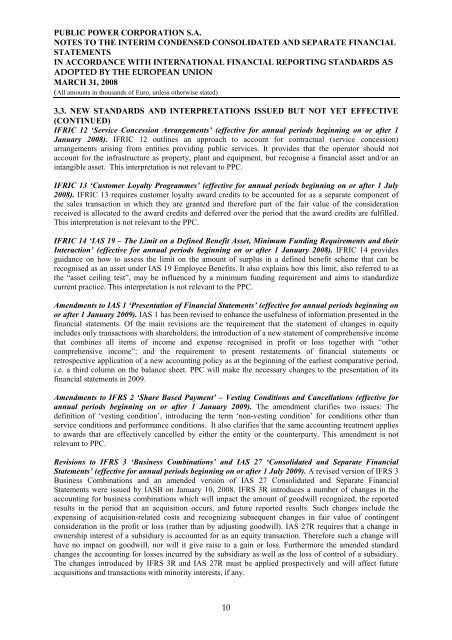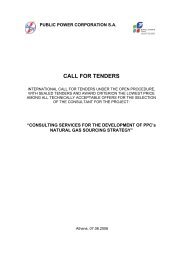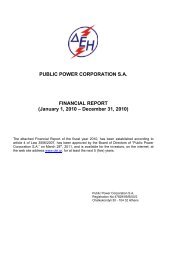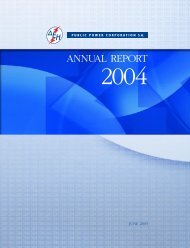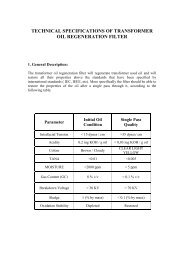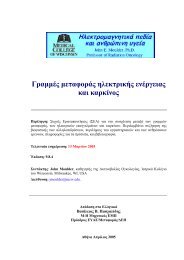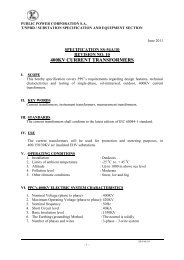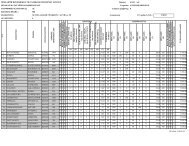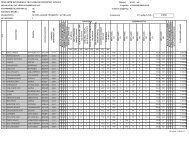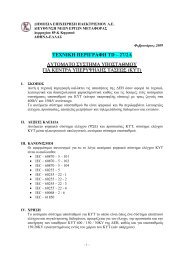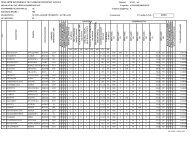31 March 2008(pdf)
31 March 2008(pdf)
31 March 2008(pdf)
Create successful ePaper yourself
Turn your PDF publications into a flip-book with our unique Google optimized e-Paper software.
PUBLIC POWER CORPORATION S.A.NOTES TO THE INTERIM CONDENSED CONSOLIDATED AND SEPARATE FINANCIALSTATEMENTSIN ACCORDANCE WITH INTERNATIONAL FINANCIAL REPORTING STANDARDS ASADOPTED BY THE EUROPEAN UNIONMARCH <strong>31</strong>, <strong>2008</strong>(All amounts in thousands of Euro, unless otherwise stated)3.3. NEW STANDARDS AND INTERPRETATIONS ISSUED BUT NOT YET EFFECTIVE(CONTINUED)IFRIC 12 ‘Service Concession Arrangements’ (effective for annual periods beginning on or after 1January <strong>2008</strong>). IFRIC 12 outlines an approach to account for contractual (service concession)arrangements arising from entities providing public services. It provides that the operator should notaccount for the infrastructure as property, plant and equipment, but recognise a financial asset and/or anintangible asset. This interpretation is not relevant to PPC.IFRIC 13 ‘Customer Loyalty Programmes’ (effective for annual periods beginning on or after 1 July<strong>2008</strong>). IFRIC 13 requires customer loyalty award credits to be accounted for as a separate component ofthe sales transaction in which they are granted and therefore part of the fair value of the considerationreceived is allocated to the award credits and deferred over the period that the award credits are fulfilled.This interpretation is not relevant to the PPC.IFRIC 14 ‘IAS 19 – The Limit on a Defined Benefit Asset, Minimum Funding Requirements and theirInteraction’ (effective for annual periods beginning on or after 1 January <strong>2008</strong>). IFRIC 14 providesguidance on how to assess the limit on the amount of surplus in a defined benefit scheme that can berecognised as an asset under IAS 19 Employee Benefits. It also explains how this limit, also referred to asthe “asset ceiling test”, may be influenced by a minimum funding requirement and aims to standardizecurrent practice. This interpretation is not relevant to the PPC.Amendments to IAS 1 ‘Presentation of Financial Statements’ (effective for annual periods beginning onor after 1 January 2009). IAS 1 has been revised to enhance the usefulness of information presented in thefinancial statements. Of the main revisions are the requirement that the statement of changes in equityincludes only transactions with shareholders; the introduction of a new statement of comprehensive incomethat combines all items of income and expense recognised in profit or loss together with “othercomprehensive income”; and the requirement to present restatements of financial statements orretrospective application of a new accounting policy as at the beginning of the earliest comparative period,i.e. a third column on the balance sheet. PPC will make the necessary changes to the presentation of itsfinancial statements in 2009.Amendments to IFRS 2 ‘Share Based Payment’ – Vesting Conditions and Cancellations (effective forannual periods beginning on or after 1 January 2009). The amendment clarifies two issues: Thedefinition of ‘vesting condition’, introducing the term ‘non-vesting condition’ for conditions other thanservice conditions and performance conditions. It also clarifies that the same accounting treatment appliesto awards that are effectively cancelled by either the entity or the counterparty. This amendment is notrelevant to PPC.Revisions to IFRS 3 ‘Business Combinations’ and IAS 27 ‘Consolidated and Separate FinancialStatements’ (effective for annual periods beginning on or after 1 July 2009). A revised version of IFRS 3Business Combinations and an amended version of IAS 27 Consolidated and Separate FinancialStatements were issued by IASB on January 10, <strong>2008</strong>. IFRS 3R introduces a number of changes in theaccounting for business combinations which will impact the amount of goodwill recognized, the reportedresults in the period that an acquisition occurs, and future reported results. Such changes include theexpensing of acquisition-related costs and recognizing subsequent changes in fair value of contingentconsideration in the profit or loss (rather than by adjusting goodwill). IAS 27R requires that a change inownership interest of a subsidiary is accounted for as an equity transaction. Therefore such a change willhave no impact on goodwill, nor will it give raise to a gain or loss. Furthermore the amended standardchanges the accounting for losses incurred by the subsidiary as well as the loss of control of a subsidiary.The changes introduced by IFRS 3R and IAS 27R must be applied prospectively and will affect futureacquisitions and transactions with minority interests, if any.10


